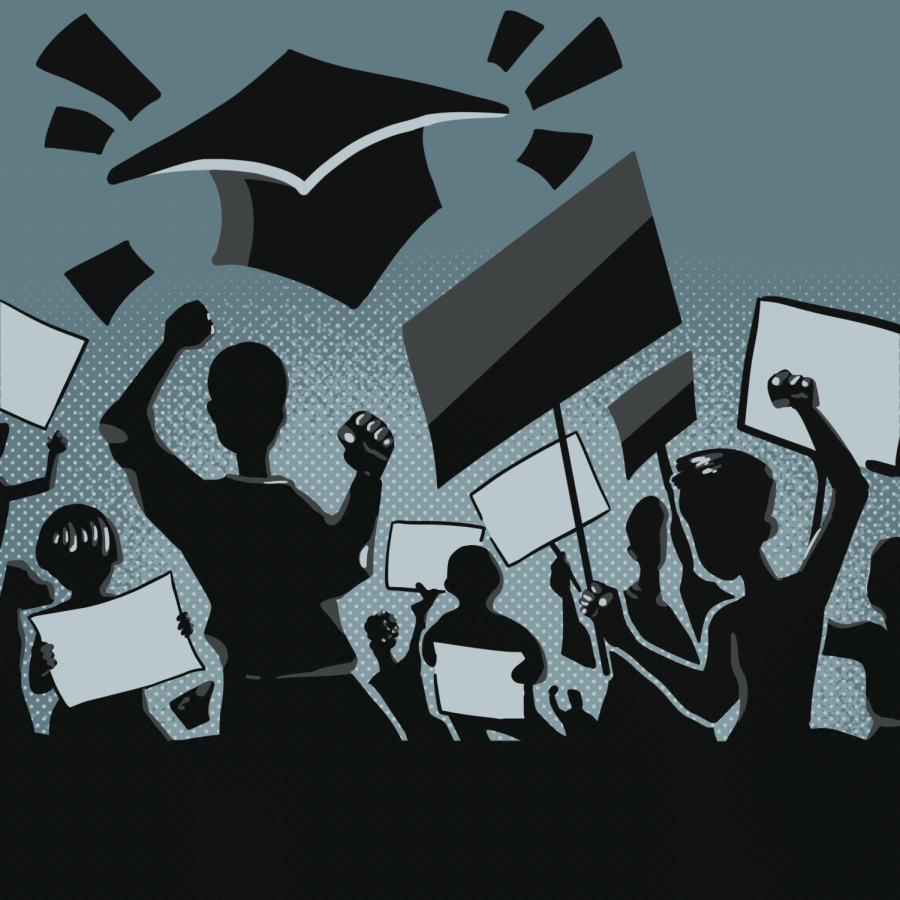UT Austin Celebrates Free Speech Week

Free Speech Week is an annual, non-partisan, non-ideological celebration that raises public awareness of the importance of freedom of speech and a free press. The freedoms of speech, expression, and assembly are fundamental rights of all persons and are central to the mission of The University of Texas at Austin. This year’s celebration takes place nationwide October 21-27.
As part of Free Speech Week, we are sharing this section with our readers to let you know about the various events taking place campus-wide. We encourage you to attend and join in the celebration and conversation. You’ll also find information about the University’s free speech rules to help familiarize everyone with the policies.
Since the ratification of the Bill of Rights in 1791, the free press has been an essential part of this country. Here at The Daily Texan and throughout Texas Student Media, we are proud to be a part of this tradition, training the next generation of journalists, providing practical learning experience in a professional environment. Our students and staff are dedicated year-round to excellence, student freedom of expression, and producing superior student media responsive to the general needs of the UT Austin community by informing, entertaining, and helping shape campus culture. If you’re a student and would like to get involved, connect with us at participatetsm.com.
Visit supportstudentvoices.org to learn more about our work at Texas Student Media and help us continue magnifying student voices at UT Austin.
Special thanks to the Foundation for Individual Rights and Expression, the American Civil Liberties Union of Texas and the Texas Freedom Network Education Fund for supporting the cost of producing this special publication.

Did you know The University of Texas at Austin has an entire chapter devoted to speech, expression and assembly in the University catalog? These provisions are a road map to your free speech and rights of expression while you’re on campus. It’s incumbent upon every student, faculty and staff member to understand what’s permitted — and what’s not — under the University’s rules.
So what’s in it? A lot, as it turns out, and too much to list here in full. But here are a few of the biggest do’s (and don’ts) so you’re never taken off guard. Consider this your University speech, expression, and assembly cheat sheet.
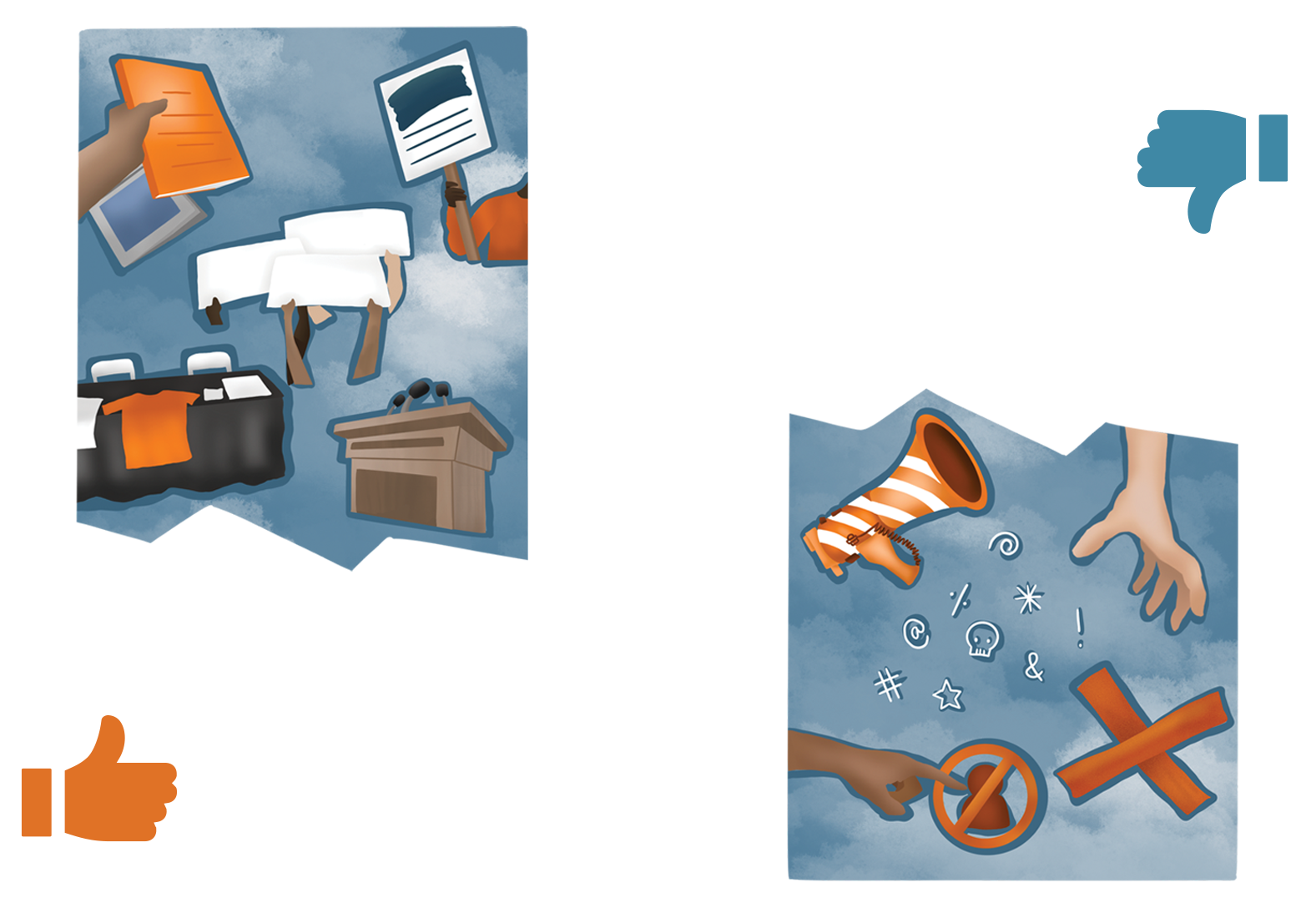
What IS Permissible
Defined as any printed material “produced in multiple copies for distribution to potential readers.” These can be leaflets, flyers, newspapers, magazines, you name it. If you’re a registered student org, you can even sell them.
A sign is “any method of displaying a visual message to others” that isn’t being distributed (that’s literature). A banner, meanwhile, can be handheld (as long as it doesn’t have poles — those are a hazard) or affixed somewhere. If you want to hang a banner on campus, you’ll need to make sure it’s an approved banner space through The Dean of Students.
Some areas (like West Mall and Speedway) are high-demand and spaces are designated and limited, so plan ahead. There are a few specific rules on where and how to table correctly, so make sure to check in with The Dean of Students office to stay within the lines.
Public assembly is “any gathering of persons, including discussions, rallies, and demonstrations.” As part of the University, your best bet is to plan ahead with The Dean of Students to avoid campus disruption and make sure you’re in a permitted space.
A guest speaker is any speaker or performer who isn’t a student, faculty member or staff member. Guest speakers can be invited by a University person or organization or a member of the public. If presenting in a common outdoor area, no advanced permission is required. If presenting in a limited public forum on campus, advanced permission is required.
What ISN'T Permissible
Defamation covers any false statement of fact about a person delivered orally (slander) or in writing (libel). In order to be considered defamation, the statement has to be expressed, factually false, holds the person up to ridicule or contempt, is made negligently, proximately causes damages, and is not a privileged statement.
Amplified sound is any sound “whose volume is increased by any electric, electronic, mechanical, or motor-powered means.” There are eight areas around campus pre-approved for amplified sound within specific time frames. Reservations with The Dean of Students are required to use it unless the host unit controls the space.
Harassment includes any hostile or threatening conduct or speech delivered orally, written down, or symbolic in nature. It’s harassment if the result of that conduct or speech is sufficiently severe enough to create an objectively hostile or threatening environment that impedes on that person’s ability to “participate in or benefit from” the University’s various privileges and offerings.
The University’s Non-discrimination Policy protects all individuals and groups from discrimination or harassment “because of their race, color, sex, pregnancy, gender, gender identity, sexual orientation, gender expression, religion, age, national origin, ethnicity, veteran status, disability, genetic information, military status, or any other legally protected basis.”
Any speech, expression or assembly that disrupts teaching, research, or general functioning of the University is prohibited. Speech, expression or assembly that disrupts the free and unimpeded flow of on-campus pedestrian or vehicular traffic is prohibited, as are disruptions of any “public assemblies, distribution of literature, guest speakers, or use of signs, tables, exhibits, or approved amplified sound by the University or another person or organization acting under the rules in (Chapter 13. Speech, Expression, and Assembly).”
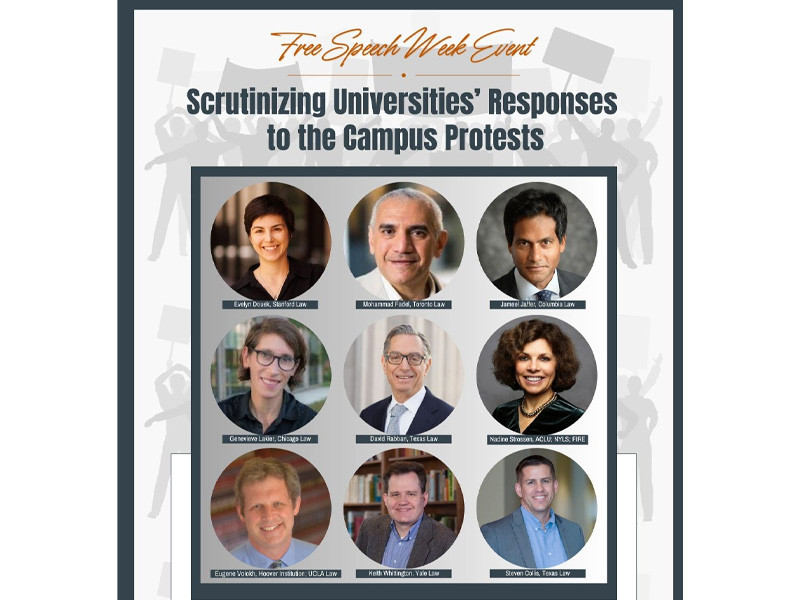
Monday, October 21, 12-1 PM
Francis Auditorium – School of Law
Join leading experts on free speech and the First Amendment for an engaging and timely discussion on recent campus protests relating to the war in Israel and Gaza — what universities, including UT, have done effectively, where they’ve fallen short, and broader implications for First Amendment rights.
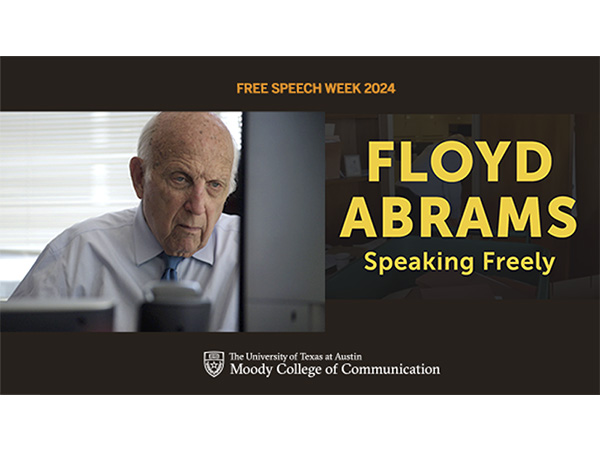
Tuesday, October 22
11 AM Screening | 12:30 PM Q&A | DMC 5.102
Join us for the Emmy-nominated documentary that explores the groundbreaking work of attorney Floyd Abrams, an emblem of America’s dedication to the foundational principles of free speech and free press.
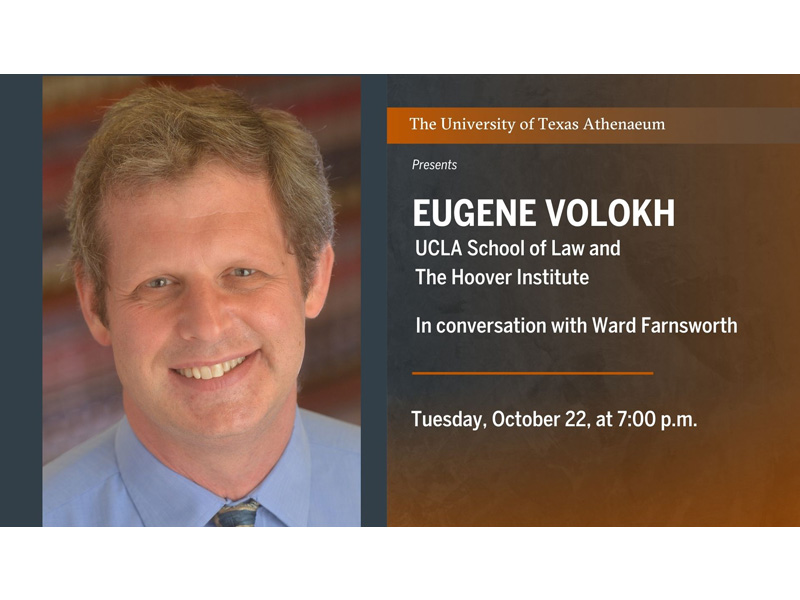
Tuesday, October 22, 7 PM
Bass Lecture Hall, LBJ School
Eugene Vololkh is among the nation’s foremost experts of free speech and the law, and is the founder of the renowned Volokh Conspiracy blog, now hosted on the Reason Magazine website. Join him for a conversation on the state of free speech today.
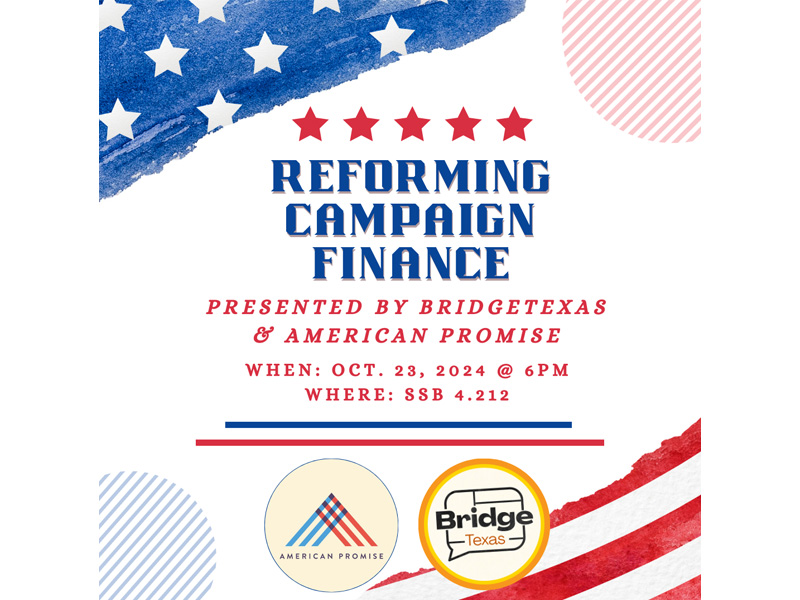
Wednesday, October 23, 6 PM
SSB 4.212
Do you think campaign donations count as free speech? Does money have too much influence in politics? We discuss these questions and more with American Promise, which is advocating the For our Freedom Amendment to enable campaign
finance reform.
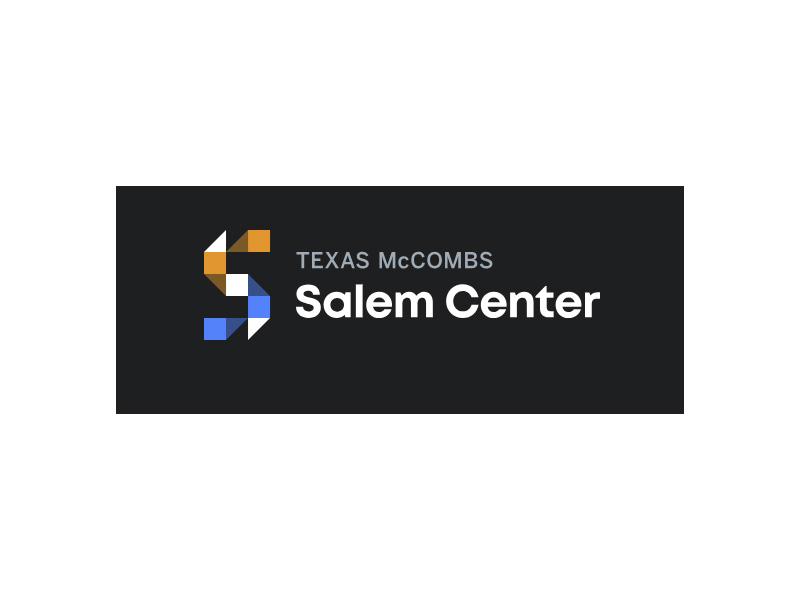
Thursday, October 24, 4 PM
RRH 4.408
Join four leading Objectivist Intellectuals as they explore the widely misunderstood concept of “Free Speech” and how it applies to some of today’s most pressing controversies.
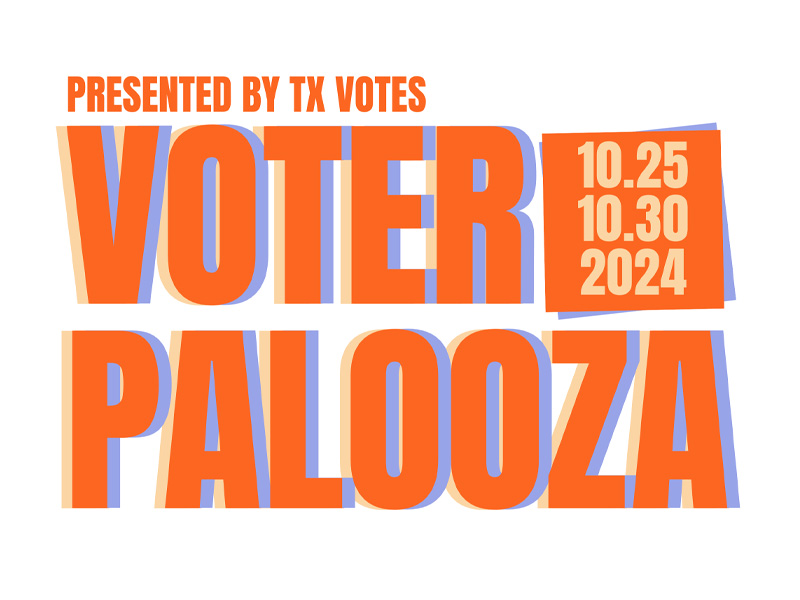
Friday, October 25, 3-7 PM
Turtle Pond Lawn
Voterpalooza is a celebration of voting early on campus! The event will have live music performances, free desserts, and free pizza. Bring your friends and make a plan to vote that works for you. You can even stop by on the way to voting at the Texas Union.

